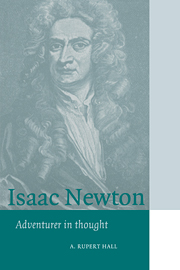Book contents
- Frontmatter
- Contents
- List of Figures
- General Editor's Preface
- Foreword
- Acknowledgement
- 1 The Hopeful Youth, 1642–1664
- 2 “The prime of my age for invention”, 1664–1667
- 3 Widening Horizons, 1667–1669
- 4 The Professor of Mathematics, 1669–1673
- 5 Publication and Polemic, 1672–1678
- 6 Life in Cambridge, 1675–1685
- 7 The Chemical Philosopher, 1669–1695
- 8 The Mathematical Principles of Natural Philosophy, 1679–1687
- 9 Private and Public life, 1685–1696
- 10 Fluxions and Fury, 1677–1712
- 11 Opticks, or a Treatise of Light, 1687–1704
- 12 Life in London, 1696–1718
- 13 A Man of Authority and Learning, 1692–1727
- 14 Later Books, 1706–1726
- 15 Kensington, 1725–1727
- Appendices
- Notes
- Bibliography
- Index
7 - The Chemical Philosopher, 1669–1695
Published online by Cambridge University Press: 12 January 2010
- Frontmatter
- Contents
- List of Figures
- General Editor's Preface
- Foreword
- Acknowledgement
- 1 The Hopeful Youth, 1642–1664
- 2 “The prime of my age for invention”, 1664–1667
- 3 Widening Horizons, 1667–1669
- 4 The Professor of Mathematics, 1669–1673
- 5 Publication and Polemic, 1672–1678
- 6 Life in Cambridge, 1675–1685
- 7 The Chemical Philosopher, 1669–1695
- 8 The Mathematical Principles of Natural Philosophy, 1679–1687
- 9 Private and Public life, 1685–1696
- 10 Fluxions and Fury, 1677–1712
- 11 Opticks, or a Treatise of Light, 1687–1704
- 12 Life in London, 1696–1718
- 13 A Man of Authority and Learning, 1692–1727
- 14 Later Books, 1706–1726
- 15 Kensington, 1725–1727
- Appendices
- Notes
- Bibliography
- Index
Summary
In his translation of Hermann Boerhaave's Elements of Chemistry (1741) Peter Shaw wrote: ‘It is by means of chemistry, that Sir Isaac Newton has made a great part of his surprizing discoveries in natural philosophy,’ an opinion which becomes more understandable, if no less extravagant, when related to Shaw's wide claim that ‘chemistry, in its extent, is scarce less than the whole of natural philosophy.’ Such a high view of chemistry would not have been expressed a century earlier, indeed the rise of chemistry as a department of natural philsophy had taken place in Newton's lifetime. In this rise the writings of Robert Boyle had played a principal part, exercising (as we have seen) considerable influence over Newton himself. Many considerations lead me to believe that Newton's chemical atomism was Boyle's corpuscular chemistry revised, made more precise and rendered more complete, but also more deeply speculative. However, as Shaw correctly states, the Queries in Newton's Opticks had done much to enhance chemistry's reputation as a branch of theoretical science, the science of matter.
When Newton's chemical interests first took shape, Opticks and its Queries were still half a century in the future. It would be rash indeed to extrapolate the sophisticated atomist theory of chemical reaction found in them back into Newton's initial experiments of the late 1660s. No positive statements can be made about their date, nor about what book or which individual may have inspired Newton to attempt this kind of investigation.
- Type
- Chapter
- Information
- Isaac NewtonAdventurer in Thought, pp. 179 - 201Publisher: Cambridge University PressPrint publication year: 1996



